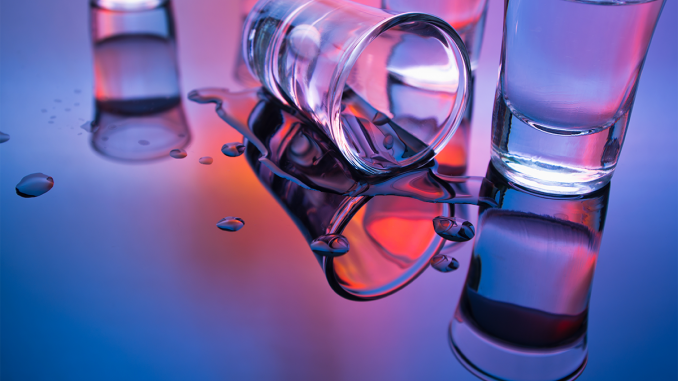
[ad_1]
Alcohol and cannabis: strange bedfellows indeed. Often discussed (and partaken) together, these ubiquitous inebriants couldn’t be more different. One is a toxin and the other a sort of skeleton key to one of the body’s most critical systems. Yet the two remain intimately linked in culture, business, and even public policy, with frequent calls to legalize marijuana by treating it just like alcohol.
For decades, scientists have studied various aspects of the relationship between them, such as whether use of one is associated with use of the other, their relative impacts on society and human health, and how alcohol dependence manifests through the endocannabinoid system itself.
We now understand that even if cannabis and alcohol can play similar social roles – encouraging college kids, soccer moms, and CEOs alike to unwind – their biological methods of action and overall risk profiles are drastically different. And in part to support policy and public health in this critical and rapidly evolving area, researchers continue to explore fascinating links between two of humanity’s favorite mind-altering drugs.

THC & Alcohol Use
Conflicting evidence exists regarding the effects of cannabis on alcohol consumption, write the authors of a recent study in the journal Psychology of Addictive Behaviors.1 Some studies suggest that cannabis is a substitute for alcohol, while others suggest that cannabis complements alcohol, thereby increasing drinking.
Medical cannabis patients and CBD consumers drank less alcohol than recreational and high-THC cannabis users.
Lead author Hollis Karoly and senior author Kent Hutchinson, both of the University of Colorado Boulder, have conducted multiple studies designed to illuminate this relationship over the last five or so years, and their latest paper goes a step further by attempting to determine the relative roles of THC and CBD.
To do so, Karoly, Hutchinon, and two other colleagues at the University of Colorado designed a naturalistic, observational study in which 120 cannabis- and alcohol-consuming adults were assigned to use one of three cannabis strains (predominately THC, predominately CBD, or balanced THC and CBD) freely over the course of five days.
When the researchers compared reported alcohol usage before and during this five-day period, they found that CBD users drank fewer drinks per drinking day and had fewer alcohol use days and fewer alcohol-and-cannabis co-use days compared to the other two groups. Interestingly, it wasn’t the presence of CBD that made the difference, but rather the absence of THC, since no differences emerged between the THC and THC+CBD groups.
This finding about the importance of THC, and thus the cannabis high, in influencing alcohol consumption aligns with that of a separate survey of 600 individuals recently conducted by Karoly, Hutchinson, and colleagues. Its results were presented at a (virtual) meeting of the Research Society on Alcoholism2 in June but have yet to be published. The researchers found that medical cannabis patients and users of primarily CBD products reportedly drank less alcohol than recreational and higher-THC cannabis users.
Cannabis use as harm reduction
A third recent study from the same University of Colorado team sought to assess the effect of cannabis use on total drinks consumed and the likelihood of binge drinking on a given day among 96 individuals undergoing treatment for alcohol use disorder.
The results, published in the journal Addiction,3 suggest an inverse relationship between cannabis use and alcohol consumption among these heavy drinkers. On days when alcohol use went down, cannabis use went up. Or, looking at it another way, individuals drank approximately 29 percent fewer drinks and were half as likely to have a binge-drinking episode on days they used cannabis compared to days they did not.
Between 2002 and 2018, cannabis use increased while problematic alcohol use decreased among young adults nationwide.
From a prohibitionist or abstinence-only perspective, this could be viewed as simply replacing one vice with another. But viewed through a harm-reduction lens, this could be seen as real progress given the well established safety profile of cannabis relative to alcohol.
Interestingly, these findings may be relevant beyond the alcohol-treatment context and throughout the broader population. A study recently published in the journal JAMA Pediatrics4 found that between 2002 and 2018, cannabis use among young adults increased (without an increase in cannabis use disorder), while alcohol abstinence increased and problematic alcohol use decreased, according to survey data from 183,000 18-to-22-year-olds nationwide.

The role of CB1
So what is going on here? A lot, it turns out. There’s a significant body of work sorting out how alcohol affects the endocannabinoid system, and how the endocannabinoid system in turn drives alcohol dependence. In particular, as the aforementioned studies on THC suggest, and additional papers demonstrate, the CB1 receptor – THC’s main target – is believed to play a critical role.
CB1 gene polymorphisms, or variations, were found to have an association with alcohol dependence in a recent meta-analysis. While research into relevant pathways continues, this receptor and other endocannabinoid system components like fatty acid amide hydrolase [FAAH], a key enzyme that breaks down CB1-binding endocannabinoids, are already being targeted in the development of new treatments for addiction to not only alcohol but also opioids and tobacco.
Nate Seltenrich, an independent science journalist based in the San Francisco Bay Area, covers a wide range of subjects including environmental health, neuroscience, and pharmacology.
Copyright, Project CBD. May not be reprinted without permission.
Footnotes
[ad_2]
Source link

Soyez le premier à commenter